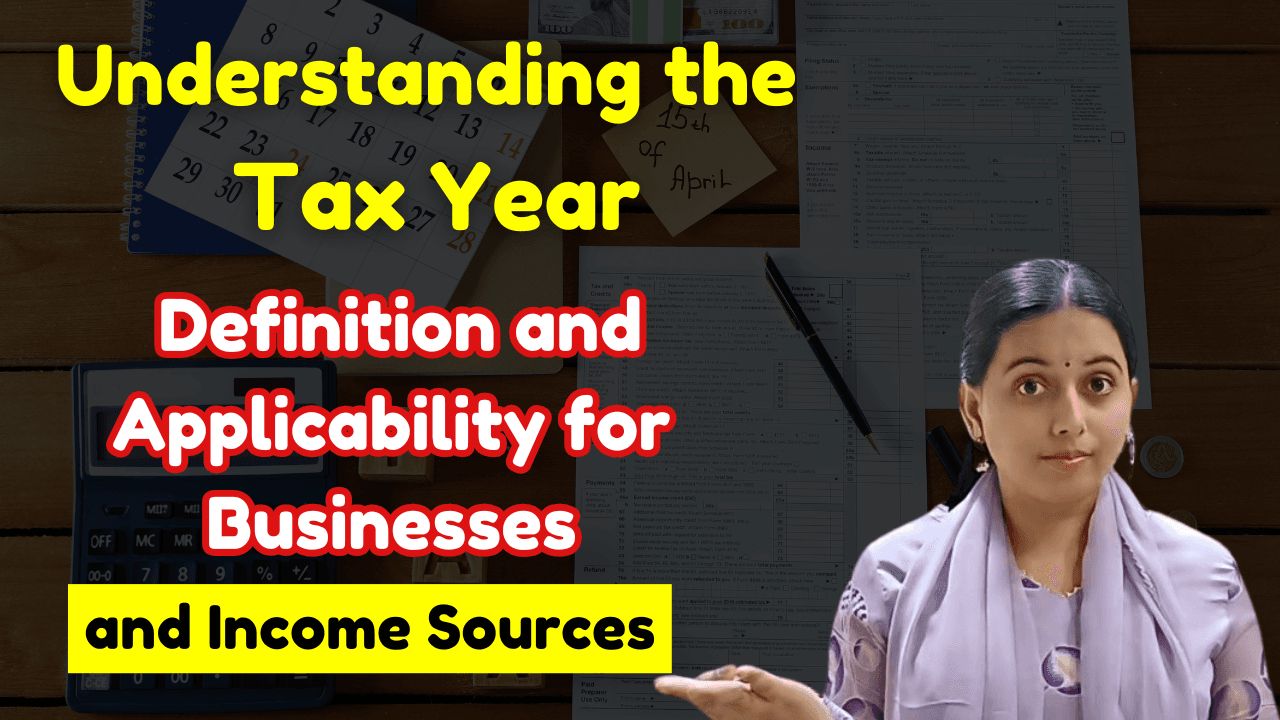Understanding the Tax Year
Understanding the Tax Year Taxation laws define the tax year as a crucial period for assessing and computing income tax. For individuals, businesses, and professionals, understanding the concept of the tax year is essential for proper tax planning, compliance, and financial reporting.
This article explains the meaning of the tax year, its standard duration, and how it applies to new businesses or new sources of income during a financial year.
What is a Tax Year?
A tax year refers to the period used to assess and compute income tax for an entity. Understanding the Tax Year According to tax laws, the tax year follows the financial year format.
Standard Tax Year
- The tax year is a 12-month period that aligns with the financial year, starting from April 1st and ending on March 31st of the following year.
- Every taxpayer—whether an individual, company, or partnership—calculates income and files tax returns based on this period.
Example:
If the tax year begins on April 1, 2024, it will end on March 31, 2025. For all taxpayers, income earned during this period will be assessed under the tax year 2024-25.
Tax Year for a Newly Set Up Business or Source of Income
When a new business or profession is started, or a new source of income emerges in a financial year, the tax year does not cover a full 12-month period. Understanding the Tax Year Instead, it begins from the date the business or income source comes into existence and ends on March 31st of the same financial year.
Key Scenarios:
The tax year for a newly established business or profession depends on:
- New Business or Profession Setup
- If a business or profession is set up on July 1, 2024, the tax year will be July 1, 2024, to March 31, 2025.
- The business will file tax returns for this shorter period within the standard tax filing deadlines.
- New Source of Income
- Understanding the Tax Year If an individual starts earning income from a new source, such as rental income from a newly purchased property or a new consultancy service, the tax year for that income starts from the date of first earnings and ends on March 31st of the same financial year.
- Example: If rental income starts on November 15, 2024, the tax year will be November 15, 2024, to March 31, 2025.
Why Does the Tax Year End on March 31st for New Businesses?
The primary reason for ending the tax year on March 31st—even for newly established businesses or income sources—is to maintain uniformity in the taxation system. This approach ensures:
✔ Smoother compliance: Taxpayers align with standard financial reporting cycles.
✔ Ease of tax assessment: Understanding the Tax Year The government can efficiently assess and collect taxes.
✔ Uniform tax filing deadlines: Businesses and individuals file returns within the same time frame.
https://www.incometax.gov.in/iec/foportal/
Tax Filing Implications for New Businesses
Businesses and professionals must keep track of their first tax year to ensure compliance with tax regulations. Key considerations include:
- Maintaining Proper Books of Accounts
- Understanding the Tax Year Newly established businesses must maintain accurate financial records from the date of commencement.
- Accounting records should reflect income, expenses, and transactions for tax assessment.
- Advance Tax Payment
- If the business is expected to have a taxable income, it may be required to pay advance tax based on estimated earnings.
- Advance tax deadlines fall in June, September, December, and March for businesses with significant income.
- Filing the First Income Tax Return (ITR)
- The first income tax return (ITR) must be filed based on the initial period of operation (i.e., from the start date to March 31st).
- The due date for filing ITR depends on whether the entity is an individual, partnership, or company.
- GST and Other Compliance
- If the business is registered under GST, the tax year determines the first GST return filing period.
- Similar timelines apply to TDS payments, professional tax, and other statutory obligations.
Conclusion
The tax year is an essential concept in taxation, ensuring uniformity in income assessment and tax compliance. Understanding the Tax Year For standard taxpayers, it aligns with the financial year from April 1st to March 31st. However, for newly established businesses or income sources, the tax year begins from the date of commencement and ends on March 31st of that financial year.
Understanding this framework helps businesses and professionals stay compliant with tax regulations, avoid penalties, and manage their financial records effectively.
If you’re setting up a new business, make sure to consult a tax expert for guidance on tax filing, advance tax payments, and compliance requirements.
For More Information : https://taxgyany.com/

